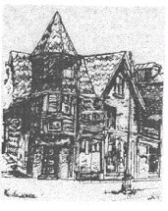INSIDE THIS ISSUE:
Patty Dickson
Pieczka
Deji Adesoye
Michelle Bailet-Jones
Steve Barfield
Gale Acuff
Elisavietta Ritchie
Solomon Haruna
Aneek Chatterjee
Karyn M. Bruce
Robert Nisbet
Laszlo Slomvits
Y. Przhebelskaya
Running Cub
Alan Britt
Richard Gartee
Fahredn Shehu
Amit Parmressar

Ann Arbor Review
is an independent
International Journal & ezine
Copyright (c)
2021-22 Francis FerdeAll rights revert back to each poet. --editor /
Southeastern Florida
------------------------------------------------
AAR history note: in print 1967 - 1980. Irregular publications 1980 - 2004. As ezine 2004 - present. Most of 55 years all together....
------------------------------------------------
staff:
Francis Ferde, editor
Silver Grey Fox, editing
Running Cub, reader
Fred Wolven, publisher
Submissions via e-mail:

Ode to a
Sock
For Anna
We all have the same problem
when we reach inside the dresser drawer
and pull out. one. sock.
Then we rifle through the drawer
in search of the other. If not there,
do we wear the one sock? It looks like
we should. After all, it was waiting
inside the darkness we created for it.
Waiting. Did it know its other was
missing?
Did it hide it? Did it toss its other half
behind the darkness? Did it want to be
just one?
I don’t match up to my mother, my father.
What were my siblings like? The ones
who died in the womb? Did we share the same
anything? I’ve spent my whole life
talking to myself about myself. Trying to
wiggle
my way around my darkened boundaries. I
didn’t
work in a factory or wear house-dresses or
pin-curls
in my hair. I tried not to flip around like
one sock in the
middle of a dryer or dangle from a
Mid-Western clothesline.
One. Sock. Twisting in the warm, spring
winds hoping a starling
would not crap all over it flying by.
My granddaughter is delighted to wear mis-matched
socks,
so when one pair is reduced to one. sock.
she keeps it,
wears the odd sock with another odd sock.
Her drawer is full of purples, reds,
stripes, and squiggly. odd. socks.
She thinks stores should sell them that way
on purpose so
no. one. is looking for the other. one.
It’s fun, she says. I can wear more colors!
Ode to a Sock! It’s glorious to be. one.
Before the Death of Donald Hall
After the Death of Jane
Would you let me in if I
showed you my latest poem
about trees and rivers
that shimmer in morning daylight
while all the lines are
drifting across the page like fish
beneath the green shiny
surface,
flipping their tails and
gurgling their songs?
I want to come in although
I have no right to be here.
I have no right to smell
the emptiness of the upstairs bedroom
where she slept, or touch
the sunlight that falls
on the few tangled hairs
left in her hairbrush.
But I want to come in and
sit in the rocking chair there by the fireplace
and walk with Dog out into
the fields of summer flowers buried now in winter snow.
I want to go out to the
barn and watch the moon rise above my head
while I linger, watching
my breath slip into the night of a poem.
I want to be here,
although I know I should not, there beside the windowsill
to watch cardinals perch
and build nests on the weathered branches
or by the cat as she
washes herself on the linoleum floor.
I have dreamt of the
fields in autumn, there where apples drop from trees
and the smell of cinnamon
muffins warms the hours long into afternoons.
I want to slip into her
words, searching for the shadows she has left behind.
I have no right to be here
while you weave the echoes of her absence
across Eagle Pond, gather
her fingerprints from coffee mugs
and the butter knife that
will never be washed again.
From the poem. The one she
must have left for you to read. After.
I did not know her. I have
no right to be here,
and I will leave with this
poem while you walk Dog
as he still searches the
fields for her along the worn-out path
to the church. I should
not be here.
There are these spaces,
you know. I hear them. between words.
When I Told Howard McCord I Was Moving to Miami
he told me not to write
poems about old people.
I wasn’t old then, so I
told him not to worry. I only write
about the dark voices
inside me. About trees and winter nights.
The Michigan silence so
loud I could never sleep. But
there wasn’t any darkness
in Florida.
The nights light up like a
carnival of white clouds.
Each night I go outside to
look up into the emptiness of blue skies
because I had lost the
darkness. The place where there are words.
Like the day my father
died, and I had nothing to say.
So, Howard McCord reminded
me not to write about old people.
And I said I wouldn’t. But
I told him they were everywhere
with sagging breasts and
bellies wrapped in beach blankets.
Or each other. Right there
in the sand.
There were Botox and
plastic surgery signs in doctor’s offices, dental offices,
on bus stop benches. I
saw a couple whose faces were stretched
and pulled tight with
twisted noses, and cheek bones puffed up like balloons.
Tiny, swollen eyes. Big
lips. There must have been a two-for-one
special-spectacle
somewhere. And the funerals. Every day a new one.
Trails of Buicks driven
into cemeteries by old people who lost a friend,
a wife, or husband. Maybe
no one. They just go to funerals like my
grandmother used to for
something to do.
I saw a mausoleum in a
cemetery with a plaque near the door
“I Told You I Was Sick.”
And another grave for a man buried
with his Cadillac. But I
didn’t write about them.
Twenty years later, I
wrote to Howard McCord and told him
that I just wanted to
write about anything, and he told me
not to write about old
people because it was “cliché” and boring.
But I told him about the
woman on the bus who dropped a dime.
I picked it up for her and
she spit at me with “why do you have to be
so nice?” Everyone stared
at me, shaking their pin-curled or
pink or blue dyed hair. Or
black-dyed bald heads. I told him about
the old man who died in
the grocery store, pushing his matted-fur dog,
keeling over in the
vegetable section. I told him about the woman with
a red-wool scarf over her
head who walks down my street. Staring. Stopping.
For hours. I told him
about the once-Amish-woman who asks me every day
if I know how old the
young women are who work for the Noah’s Ark exhibit
in Kentucky, and if they
are virgins.
After thirty years, I
wrote to Howard McCord and said I was still trying to write.
He asked me who I was and
told me maybe I should write about old people.
No one does that anymore.
Karyn M. Bruce, Biscayne Park, Florida